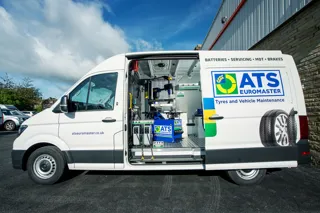Some van fleet operators are discovering that replacement cycles can be stretched to up to eight years without encountering major problems, the Association of Fleet Professionals (AFP) is reporting.
Paul Hollick (pictured), chair at the industry professional body, said that a range of new skills had been developed by fleet managers that were making these longer cycles operationally viable and economically attractive.
He said: "Businesses have, of course, been forced into this situation by the huge difficulty of getting hold of new vans in recent years but in the process, have found that replacement cycles can be extended to lengths that would previously have been considered unimaginable.
“Some fleets that typically operated vans for 5-6 years at a maximum are now, in some cases, hitting 7-8 years without encountering any real difficulties.
"The overall message is that more management attention is needed to keep these vehicles safe and reliable but that the economic benefits outweigh the issues.”
A key part of the strategy was simply to become “really good” at service, maintenance and repair (SMR) management, Hollick added.
He said: “We are seeing a whole range of developments.
"Some of these are relatively simple, such as bundling SMR jobs together to minimise the number of workshop visits or carrying out pre-MOT checks so that you know a van is going to pass. At the other extreme, we are seeing increased use of telematics and fleet management software to anticipate potential issues.
“It’s all about acknowledging that your vehicles are likely to become less reliable but putting provisions in place that allow for that problem, such as operating a pool fleet.
"Of course, there are limits. Few fleets want to operate vans over 150,000 miles, for example, but for many businesses that represents several years of operation.”
Hollick said that a similar development could get underway among car fleets thanks to rising leasing costs but that human resources considerations and other pressures meant that cycles would probably not reach the same extreme as vans.
He added: “In most car fleets, of course, there is a strong employee desire to electrify thanks to low benefit in kind taxation and this creates pressure for renewal but rising costs – which could be as much as 20% higher month-by-month – could potentially mean that we see replacement cycles generally extended. A step up to average 4-5 year cycles is certainly feasible.”






















Ross Baxter - 22/06/2023 13:49
Do new Fleet Manager skills include having a magic wand and bottomless pockets?